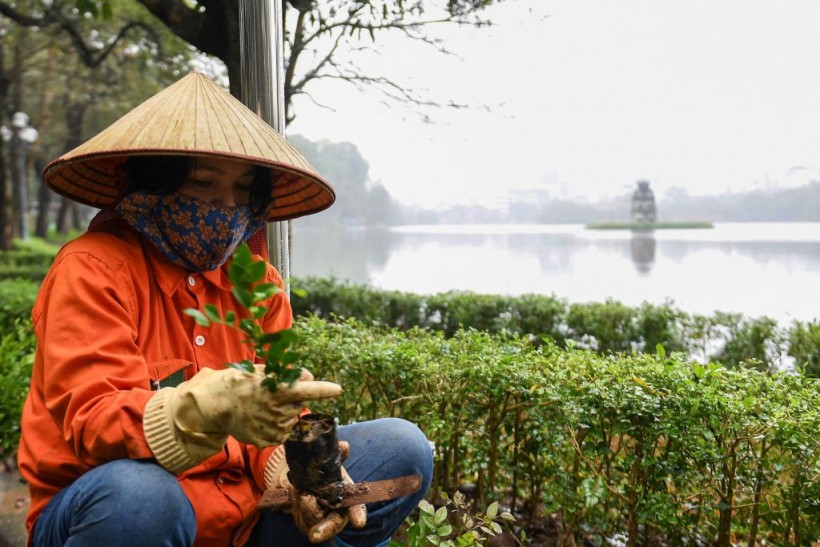Gardening is considered one of the best hobbies for many people. Growing plants can be beneficial to the environment and fight against climate change. Understanding about seasonal gardening can be beneficial for farmers and homeowners.
Changing seasons or conditions can significantly affect people's gardening. It is best to consider preparing to ensure that planting will be successful. In urban areas, it can improve air quality to fight pollution.

(Photo : by NHAC NGUYEN/AFP via Getty Images) Understanding about seasonal gardening will be helpful gardeners, ensuring plants and crop will grow. Every season needs a unique gardening understanding.
In addition to helping the environment, gardening is good for people's health. According to reports, it can increase vitamin D, and potentially boost people's mood. It is good for the heart by reducing stress. As the season changes, homeowners should equip themselves with the necessary knowledge about seasonal gardening. Here are some of the important tips that gardeners should know!
1. Gardening in the Winter
In winter conditions, the main threats are heavy snow, freezing conditions, and blizzards. Homeowners should understand different ways of managing soil. According to reports, winter gardening focuses on the maintenance of gardens. Because of the freezing, it will be challenging for plants to grow.
The main concern is ground shifting, which causes the soil to potentially crack. For homeowners, the best way is to apply evergreen boughs and protect their plants from freezing or snowstorms. Reports advise that gardeners should always monitor their plants to prevent potential infestations.
2. Gardening in the Spring
Spring gardening is considered one of the ideal seasons to plant. The ground will begin to warm, allowing gardeners to plant with ease. Homeowners should check the soil conditions that are favorable to planting. Additionally, gardeners can start to transplant plants, including vegetables.
Homeowners have the option to choose flowers or plants they like. As spring begins, gardening bed preparation is advisable after experiencing rounds of heavy snow. In addition, understanding blooming dates and times is advisable, as is putting nutrients into the soil.
3. Gardening in the Summer
Summer gardening is tricky for others due to potentially hotter environments, warning of the risks when transplanting plants. Planting vegetables is advisable in the summer, considering that the soil has enough fertilizers and nutrients. Buying seasonal plants is recommended to ensure they will grow.
Gardeners should be aware of the sun's location to avoid prolonged exposure to hotter temperatures for crops or plants. When summer begins, it is the best time to plant, so homeowners should provide sufficient water. Moisture is essential to avoid being dried, and soil moats are very helpful.
In addition, it is best to anticipate potential dead leaves or foliage.
Also Read: Pumpkins And Winter Squash Tips: 3 Best Ways to Harvest Your Crops
4. Gardening in the Fall
In the fall, it is time to prepare for the cold-adapted plants. Gardeners should bring nutrients to their soil, nourishing it for the change of season, and ensuring successful growth. Homeowners can have more time for the early spring blooms. According to reports, gardening and planting in the fall are beneficial due to fewer weeds and insects. Precipitation is mostly likely, helping to bring plant moisture.
Related Article: 7 Sustainable Solutions to Water Recycling
For more similar, don't forget to follow Nature World News
© 2024 NatureWorldNews.com All rights reserved. Do not reproduce without permission.

![Tsunami Hazard Zones: New US Map Shows Places at Risk of Flooding and Tsunamis Amid Rising Sea Levels [NOAA]](https://1471793142.rsc.cdn77.org/data/thumbs/full/70325/280/157/50/40/tsunami-hazard-zones-new-us-map-shows-places-at-risk-of-flooding-and-tsunamis-amid-rising-sea-levels-noaa.jpg)



